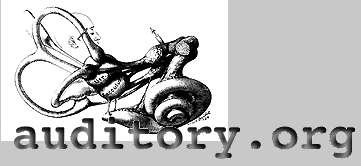
Welcome to the web site of the AUDITORY list, which provides information about and related to the AUDITORY list, an email list for the discussion of organizational aspects of auditory perception. The list was created in 1992 by Professor Albert S Bregman of the McGill University Department of Psychology. It is currently maintained by Dan Ellis, who also runs this web site.
On this page: Notices - Joining/leaving AUDITORY - AUDITORY archives - Local information - Seminars - Journal contents - Source code - Other sites - Links to links
This section contains messages that I have decided to distribute through the web rather than sending to the AUDITORY list. I have refrained from posting them because of their size or tangential relevance. I hope this is an appropriate alternative.
2020-12-31: Moved to a new linode server.
2001-04-30: This site has moved to a new address, www.auditory.org.
By joining the AUDITORY email list, you will receive all the postings via email, and you will be able to contribute to the discussions. You can join the list by filling in the form on the AUDITORY membership questionnaire.
Subscribed members can leave the AUDITORY list, or modify their current details (including email address) by visiting their private AUDITORY information edit page, and selecting the "no messages" option at the bottom of that page. Please refer to the message you received when joining the list for the URL of the edit page, or you can contact me to retrieve it for you.
Messages to the list since its creation in 1992.
There are numerous seminar series around the planet devoted to issues of audition relevant to this group. Here are collected some web links to the ones I know about. Please send me suggestions for additions.
Archives of talk announcements for the Stanford Hearing Seminar, organized by Malcolm Slaney. (The original archive at UCSC appears to have been taken offline, sadly.)
The UC Berkeley Ear Club, hosted by the UCB Auditory Perception Lab.
Current and recent talks at the Boston University Hearing Research Seminar series, hosted by the BU Hearing Research Center.
The Auditory Physiology Seminar Series at the Eaton-Peabody Laboratories in Boston.
I'm afraid I haven't been keeping all of these up to date, so coverage is partial at best. If anyone knows better sources for this data, please let me know.
Indexes to some recent ASA meetings including all the abstracts since the 124th meeting (1992). (The ASA provide an excellent searchable index to the most recent meeting).
The Acoustical Society also offers Tables of contents for JASA for 1995 (vol 97) onward.
John Krantz's list of psychologically-related electronic journals and periodicals etc.
The journal Music Perception has its own web site, including abstracts.
The Journal of New Music Research provides abstracts for the journal issues, pictures and sound examples.
A beautifully-organized web presentation on the problem of sound localization research has been put together by Dick Duda, including as clear and succinct a definition of the problem of auditory scene analysis as you will find anywhere.
Be entertained and edified by the polished SineWave Speech page at Haskin's lab - hear for yourself speech without traditional speech cues.
I'm afraid this is a meta-link-list. Rather than compiling my own comprehensive list of auditory-related sites, here are some pointers to other peoples. I wirry that this may be a degenerate activity - list of links to other people's lists of links, but I've tried to be selective for pages with some description and/or very wide coverage.
The SOCRATES Thematic Network in Phonetics and Speech Communication has a project in Computer-Aided Learning, which has resulted in a well-edited Inventory of Internet Resources including useful annotated indexes of linguistic data, speech processing tools, etc.
There is a very comprehensive index of WWW Information for Speech/Acoustics Research from the lab of Prof. Shikano at the Nara Institute of Science and Technology (NAIST).
A list of auditory links from the Darmstadt Auditory Research Group in Germany. Includes a couple of lines describing the sites of each of about 50 research groups.
Please send me your suggestions of other things to do on this page.